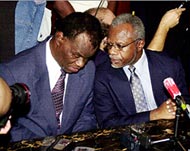United Nations to order Haiti troop dispatch
The UN has held an urgent meeting to authorise the dispatch of troops to Haiti after President Jean-Bertrand Aristide resigned in the face of an armed revolt.

The United States and France, which called the security council meeting on Sunday, indicated they wanted a resolution approving an interim force to help keep the troubled Caribbean nation from descending into anarchy.
Council president Wang Guangya of China confirmed the new interim leader of Haiti, Boniface Alexandre, had formally asked the council for troops after Aristide fled the country earlier in the day.
“The president of Haiti has already asked for assistance … so I don’t think there are any obstacles to the marines going in, but it would be helpful to have a resolution,” said the US ambassador to the United Nations, John Negroponte.
Draft resolution
Diplomats said it was not clear if the resolution could be agreed on Sunday evening, saying it might be held over until Monday.
The draft resolution – still under negotiation in the council -would approve the troops for two months while the United Nations plans a regular UN peacekeeping force to be deployed later.
 |
|
An African country has said it will |
“The situation in Haiti constitutes a threat to international peace and security and to stability in the Caribbean, especially through the outflow of people to other states in the sub-region,” the draft text says.
It calls on UN nations to “support the constitutional succession and political process now under way in Haiti in order to promote a peaceful and lasting solution to the current crisis”.
Rebel uprising
Canada on Sunday joined France and the US in announcing it would contribute troops for Haiti, where dozens of people have been killed since a rebel uprising began on 5 February.
Caribbean nations had called on Thursday for the security council to immediately authorise sending an international force, but France and the US had instead wanted a political resolution to the stand-off.
For the Security Council, Sunday’s meeting marks a return to 1991 when it first took up the case of Aristide, who had been toppled from power in a coup that left nations in the region worried about the fate of democracy.
But in recent days both Paris and Washington have indicated it was time for Aristide to go, which he did early on Sunday, setting off a wave of violence in the nation’s capital, Port-Au-Prince.
Mob rampage
Huge clouds of smoke billowed over the city as mobs went on the rampage, and at least four people were reported killed by gunfire.
Lawlessness prevailed in the city centre, where thousands of people engaged in a looting spree, erected flaming barricades and fired guns in the air.
Police announced a dusk-to-dawn curfew from Sunday evening.
According to the draft, the resolution would authorise an interim force “to contribute to a secure and stable environment in the Haitian capital and elsewhere in the country as appropriate and as circumstances permit”.
Humanitarian assistance
The force would also be mandated to provide humanitarian assistance and help aid workers to bring relief to the country, which had seen widespread looting in the wake of the armed rebellion.
Meanwhile, a US State Department official said an African country, which he declined to name, had agreed to give asylum to the former Haitian president.
The official said South Africa, the continent’s diplomatic heavyweight, had been helping to find a destination for Aristide.
 |
|
Boniface Alexandre (L) has been |
NBC television news reported that Aristide might end up in the Central African Republic.
But the State Department official said he could “neither confirm nor deny it”.
Asylum
Aristide initially travelled to the Dominican Republic and then to the eastern Caribbean nation of Antigua and Barbuda after resigning as president, the Haitian consul in Santo Domingo said.
The consul said Aristide had left the Dominican Republic, which shares the Caribbean island of Hispaniola with Haiti, and gone to Antigua so his aircraft could refuel, and was then planning to travel to Morocco.
But Morocco said it would not grant Aristide asylum.
Panama offered temporary refuge of up to two weeks to Aristide after US Secretary of State Colin Powell asked it to take him until he was given asylum in another country.
It was not clear whether Aristide had accepted Panama’s offer, or if he was even aware of it.
Aristide said he resigned to avert “a bloodbath”.